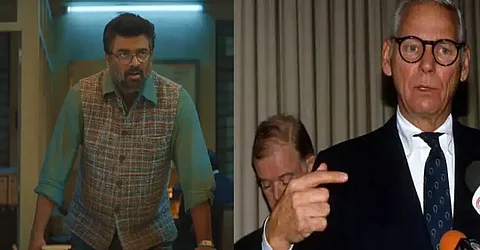

The Railway Men was released on Netflix on November 18, 2023, and ever since then, the movie has reignited the pain suffered by thousands of Indians from the Bhopal Gas Leak tragedy. Starring R Madhavan, Kay Kay Menon, Divyenndu, Babil Khan, and Juhi Chawla in the leading roles, The Railway Men is a story of courage and revelations of India's biggest industrial tragedy. The Railway Men is inspired by true stories set against the backdrop of the Bhopal Gas Leak of 1984. While the makers of Netflix's The Railway Men points out that the story is fictional but inspired by true stories, it has indeed ignited many questions in fans' mind. Since you have landed on this page, True Scoop News assumes that you have already watched The Railway Men and have questions regarding 'real-life' Union Carbide Chairman Warren Anderson. Below is everything you need to know about what happened to Warren Anderson-
Warren Anderson was an American businessman who was the Chairman and CEO of the Union Carbide Corporation (UCC) at the time of the Bhopal tragedy in 1984. Anderson was charged with manslaughter by Indian authorities. In 1989, UCC reportedly paid $479 million dollars to the Indian government (equivalent to $907 million dollars in 2021) to settle litigation stemming from the disaster. However, what was indeed a failure of the then government that Warren managed to flee from India, despite being charged with manslaughter.
As per a report, then Indian PM Rajiv Gandhi was pressured by the US government to let Warren Anderson go. Reportedly, Senior Congress leader Arjun Singh, who was then the Chief Minister of MP, wrote in his autobiography A Grain of Sand in the Hourglass of Time that home secretary R.D. Pradhan called him "on the instructions of the then Union home minister P.V. Narasimha Rao".
However, Pradhan denied the allegation, saying he was Chief Secretary of Maharashtra at the time and became Union home secretary only in January 1985. The report further suggested that Moti Singh, who was the Bhopal collector at the time of the disaster, said Anderson managed to get away by using a phone in the room where he was detained to contact persons in the US.
The US embassy reportedly increased diplomatic pressure on the Indian government, which released Anderson on a personal bond. However, Warren Anderson never returned to face trial and was declared a fugitive by Indian courts. Notably, the Indian Government continued its effort to extradite Warren. In fact, Prime Minister Manmohan Singh during his tenure said that his government would try to ensure that the US takes a "more favorable attitude" towards the extradition of former Union Carbide chief Warren Anderson to stand trial in India in the Bhopal gas leak case. Warren died at a nursing home in Vero Beach, Florida, on September 29, 2014.